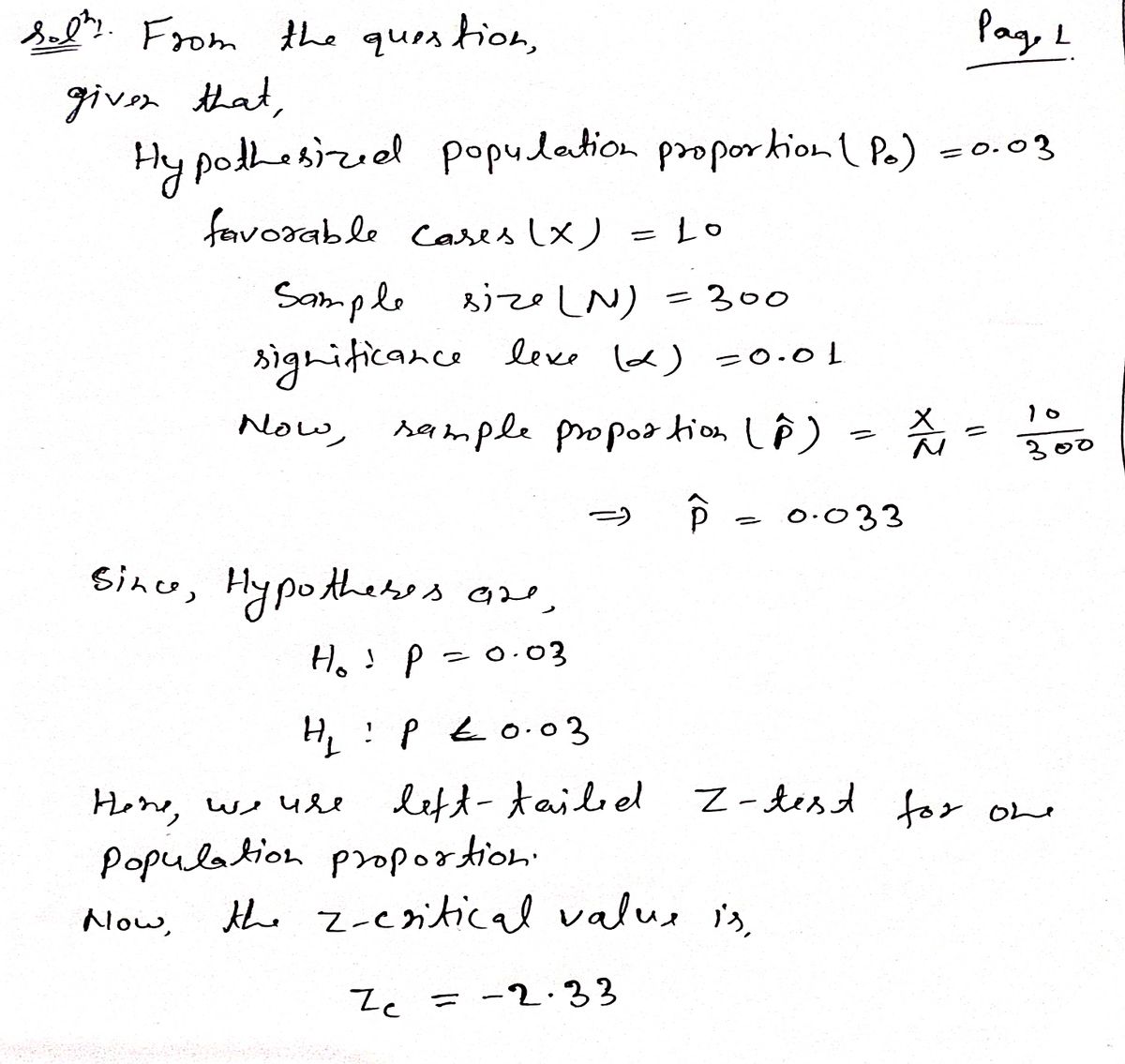A manufacturer of light bulbs may want to be reasonably certain that less than 3% of the bulbs are defective. Suppose 300 bulbs are randomly selected from a very large shipment. Each tested and 10 defective bulbs are found. Does this provide sufficient evidence for the manufacturer to conclude that the fraction defective in the entire shipment is less than 0.03? The correct conclusion at 1% significance level if the test statistic value is 0.3384, is: A. Fail to accept the null hypothesis, the fraction defective in the entire shipment is at least 0.03. B. Do not reject null hypothesis, the fraction defective in the entire shipment is at least 0.03. C. Do not reject null hypothesis, the fraction defective in the entire shipment is less than 0.03. D. Fail to accept the null hypothesis, the fraction defective in the entire shipment is less than 0.03.
A manufacturer of light bulbs may want to be reasonably certain that less than 3% of the bulbs are defective. Suppose 300 bulbs are randomly selected from a very large shipment. Each tested and 10 defective bulbs are found. Does this provide sufficient evidence for the manufacturer to conclude that the fraction defective in the entire shipment is less than 0.03? The correct conclusion at 1% significance level if the test statistic value is 0.3384, is: A. Fail to accept the null hypothesis, the fraction defective in the entire shipment is at least 0.03. B. Do not reject null hypothesis, the fraction defective in the entire shipment is at least 0.03. C. Do not reject null hypothesis, the fraction defective in the entire shipment is less than 0.03. D. Fail to accept the null hypothesis, the fraction defective in the entire shipment is less than 0.03.
MATLAB: An Introduction with Applications
6th Edition
ISBN:9781119256830
Author:Amos Gilat
Publisher:Amos Gilat
Chapter1: Starting With Matlab
Section: Chapter Questions
Problem 1P
Related questions
Question
A manufacturer of light bulbs may want to be reasonably certain that less than 3% of the bulbs are defective. Suppose 300 bulbs are randomly selected from a very large shipment. Each tested and 10 defective bulbs are found. Does this provide sufficient evidence for the manufacturer to conclude that the fraction defective in the entire shipment is less than 0.03? The correct conclusion at 1% significance level if the test statistic value is 0.3384, is:
- A. Fail to accept the null hypothesis, the fraction defective in the entire shipment is at least 0.03.
- B. Do not reject null hypothesis, the fraction defective in the entire shipment is at least 0.03.
- C. Do not reject null hypothesis, the fraction defective in the entire shipment is less than 0.03.
- D. Fail to accept the null hypothesis, the fraction defective in the entire shipment is less than 0.03.
Expert Solution
Step 1

Step by step
Solved in 2 steps with 2 images

Recommended textbooks for you

MATLAB: An Introduction with Applications
Statistics
ISBN:
9781119256830
Author:
Amos Gilat
Publisher:
John Wiley & Sons Inc

Probability and Statistics for Engineering and th…
Statistics
ISBN:
9781305251809
Author:
Jay L. Devore
Publisher:
Cengage Learning

Statistics for The Behavioral Sciences (MindTap C…
Statistics
ISBN:
9781305504912
Author:
Frederick J Gravetter, Larry B. Wallnau
Publisher:
Cengage Learning

MATLAB: An Introduction with Applications
Statistics
ISBN:
9781119256830
Author:
Amos Gilat
Publisher:
John Wiley & Sons Inc

Probability and Statistics for Engineering and th…
Statistics
ISBN:
9781305251809
Author:
Jay L. Devore
Publisher:
Cengage Learning

Statistics for The Behavioral Sciences (MindTap C…
Statistics
ISBN:
9781305504912
Author:
Frederick J Gravetter, Larry B. Wallnau
Publisher:
Cengage Learning

Elementary Statistics: Picturing the World (7th E…
Statistics
ISBN:
9780134683416
Author:
Ron Larson, Betsy Farber
Publisher:
PEARSON

The Basic Practice of Statistics
Statistics
ISBN:
9781319042578
Author:
David S. Moore, William I. Notz, Michael A. Fligner
Publisher:
W. H. Freeman

Introduction to the Practice of Statistics
Statistics
ISBN:
9781319013387
Author:
David S. Moore, George P. McCabe, Bruce A. Craig
Publisher:
W. H. Freeman